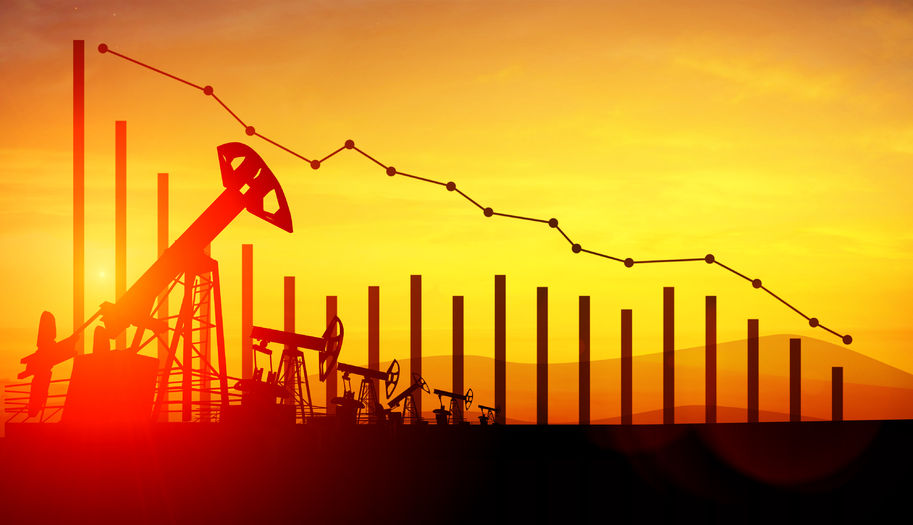Is there a correlation between oil prices and the stock market?
Well, the answer is not a simple one.
According to Market Watch, there is some correlation between oil prices and the stock market, which they argue was strongly evident several times in 2016. In a working paper from 2014, the European Central Bank too found that in the decades since 2001 the increasing treatment of oil as a ‘financial asset’ has meant that ‘oil prices in general immediately react to changes in other financial assets’. It discovered that a 10% increase in the price of oil leads to a weakening of the US dollar, while a weakening of the US dollar of 1% causes oil prices to rise by 0.73%.
However, economists at the Federal Reserve Bank of Cleveland studied the relationship between oil prices and the stock market in 2008 and found that, while both oil prices and the S&P 500 had mostly climbed over the previous decade, they had often moved in opposite directions. They concluded that the correlation between oil prices and stock prices is weak.
Meanwhile, The Brookings Institution in Washington noted that, in recent years, oil and stock prices have fallen alongside each other, but suggested it’s because they’re both reacting to a common factor – an overall softening of global demand, which hurts corporate profits as well as demand for oil – not to one another. And in 2014, Fortune stated that, over time, the correlation between oil prices and stock prices is weak. ‘Sometimes oil prices follow the stock market and vice versa. And sometimes they go in opposite directions.’
But even when opinions differ on the relationship, no one is arguing against the overall importance of oil to the UAE economy. And it’s this economy where we all do business.
The UAE and oil
It’s hard to overstate the importance of oil in the UAE. It sits on 97.8 billion barrels and is the world’s seventh-largest petroleum producer. This year its hydrocarbon export revenues are projected to be around USD 65bn, roughly 20% of all exports.
It’s hard to overstate the importance of oil in the UAE. It sits on 97.8 billion barrels and is the world’s seventh-largest petroleum producer.
Though the country is working to decrease its dependency on oil, particularly in Abu Dhabi, plans to increase production from 2.9 to 3.5 million barrels per day by 2020 suggest the habit won’t die any time soon. But oil is volatile and while we hear regular headlines about the direction of prices, what is not so well understood is what causes them to move, or what it means for the rest of the economy.
For brokers and financial professionals, this is just one of many concerns, but it’s good to have an understanding of the nuts and bolts, so let’s get our hands dirty.
How is oil priced?
There are hundreds of different types of crude oil produced around the world and they are graded according to different properties, such as how much sulphur they contain and whether they’re ‘light’ or ‘heavy’. To complicate matters, prices also factor in the cost of refining crude oil into useable products.
There are three standards against which the many types of crude oil are priced. ‘Dubai’ is the benchmark for crude in the Middle East, while ‘Brent crude’ and ‘West Texas Intermediate (WTI)’ are used globally. There’s a lot of debate about the factors that affect the benchmarks, but in general the prices are set by oil traders, refiners, producers, hedge funds, and speculators. The reaction of all these parties to developments around the world causes prices to rise or fall.

The role of OPEC
The Organization of Petroleum Exporting Countries (OPEC) is a body of 14 countries, mostly in the Middle East and North Africa (MENA) region, that holds an estimated 81% of the world’s total crude oil reserves – 65% of that in the Middle East. OPEC exists to ‘co-ordinate and unify petroleum policies among member countries’ and one of the key ways it does this is through a quota system, under which member countries must (or at least are supposed to) adhere to yearly production quotas.
The Organization of Petroleum Exporting Countries is a body of 14 countries, mostly in the Middle East and North Africa (MENA) region, that holds an estimated 81% of the world’s total crude oil reserves – 65% of that in the Middle East.
At the end of November last year OPEC agreed to cut output by 1.2 million barrels per day, aiming to offset a global glut. Crude oil prices shot up by 10%. Last month the price inched forward again with the news that the deal may be extended. OPEC doesn’t dictate the price, but it can affect it considerably.
How market confidence affects oil prices
While OPEC and other oil producing countries can control tangible supply and demand by limiting their output, speculation over future supplies also has a strong bearing on prices. The futures market appeals to two types of buyer – hedgers and speculators. While the first type might be an airline protecting itself against rising prices, the second has no real intention of ever taking delivery of the commodity – they’re guessing the price direction to try and make money.
What this means is that the belief alone that ‘oil demand will increase’ can send the price soaring, as speculators and hedgers scramble for oil futures contracts. And if a drop is expected, they’ll be racing to sell.

For example, if a story breaks about a potential disruption to Nigerian oil supplies due to militant attacks, as occurred in 2016, the price rises. Why? Because unrest hampers production, causing a scarcity. Conversely, if economic sanctions are lifted, as they were from Iran in January last year, the market is suddenly looking at more freely available oil, which means the price is likely to go down.
Just this week, after the US launched air strikes on Syria, the price of crude oil hit a one-month high. The risk of conflict spreading to other MENA oil-producing countries raised the spectre of short supply, so the market raced to stockpile, driving prices up.
As well as human disruption, natural disasters can have a dramatic effect on oil prices. A notable example was Hurricane Katrina, which hit the US gulf coast in 2005 with devastating effect and was soon followed by Hurricane Rita. Between them, Katrina and Rita damaged 19% of US oil production, destroying 113 offshore oil and gas platforms. In response to the impact on US oil production, both real and speculated prices rose by three dollars per barrel.
Meanwhile, new technology is threatening to disrupt the oil market and force prices down. It could be a new development that boosts the efficiency of oil production and, therefore, reduces the cost, or a rival process that threatens demand, such as fracking or the development of renewable energy sources. The growth of the electric car industry, for example, forecast to gain a 35% market share by 2040, is shaking confidence in the future value of oil.
New technology is threatening to disrupt the oil market and force prices down.
The real impact of oil price movements
Changes in oil prices currently ripple out across the consumer economy, mainly because of its role in the transportation of goods. As a general rule, cheaper oil means your money goes further, while more expensive oil means belts get tighter. If you run a transport business, or a business that relies on transportation, you too will feel the effects of oil price fluctuations keenly.
The question is, do you pass on the price changes to your customers or do you absorb them? Many heavy users of oil can’t immediately adjust their business model, so there is a lag effect, which makes the consequences of changing oil prices hard to predict. As energy expert Robert McNally notes in his book Crude Volatility: The History and the Future of Boom-Bust Oil Prices, ‘when oil prices change, supply and demand do not adjust swiftly in response’. So even if you think you’re spotting patterns, it doesn’t follow that you’ll predict the wider consequences.
Speaking as a financial professional, unless oil is the mainstay of your day-to-day activity, it won’t make sense to spend too much time trying to predict where it will go next. Perhaps a general awareness is better than your undivided attention.
About the author: Anatol Burankov, GCC FX Desk at GMG.
Anatol works on GCC FX Desk at GMG and is responsible for the interbank brokerage for GCC currencies and currency swaps. From 2012 to 2014 he worked as a vice president at Socgen, responsible for emerging market currencies, trading and market making. Prior to this he worked for UBS in Zurich as an emerging markets trader and market maker.


